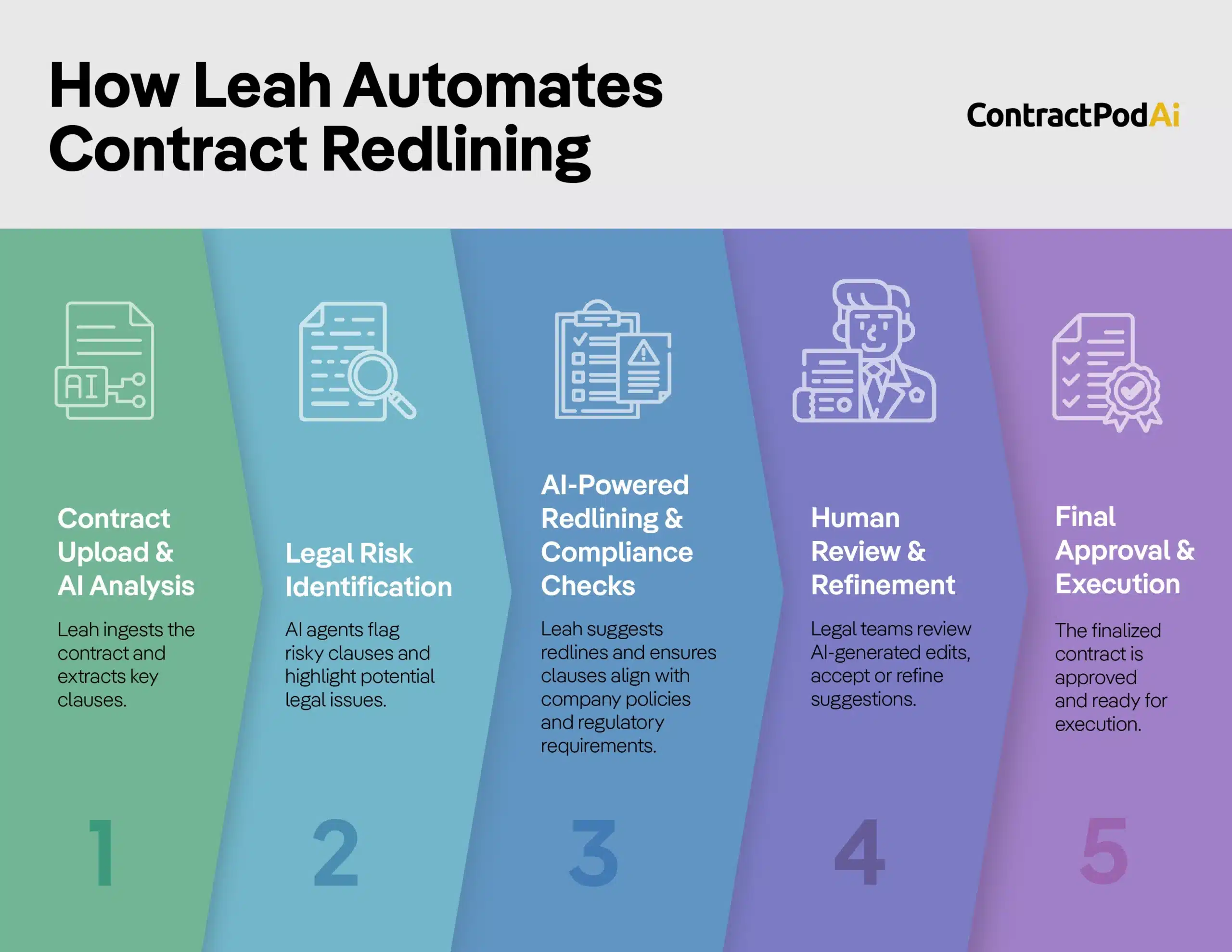Published: February 26, 2025
Updated: September 24, 2025
Executive Summary
Agentic AI represents a paradigm shift in enterprise automation, moving beyond traditional single-task AI to collaborative, autonomous systems that can handle complex legal and business workflows. With 40% of enterprise applications expected to integrate task-specific AI agents by 2026, up from less than 5% today, according to Gartner, organizations are rapidly adopting these intelligent systems to transform contract management, compliance, and operational efficiency.
This comprehensive guide explores how agentic AI, exemplified by solutions like Leah by ContractPodAi, is revolutionizing legal operations through multi-agent collaboration, task-specific expertise, and seamless human-AI integration. Understanding and implementing agentic AI has become critical for maintaining competitive advantage in legal and enterprise operations.
What Is Agentic AI and How Does It Transform Business Operations?
Understanding the Core Technology
Legal and enterprise operations are increasingly complex, with organizations struggling to manage workflows efficiently. Manual processes, siloed systems, and scalability challenges create inefficiencies that slow decision-making and increase costs.
Traditional AI solutions, while helpful, often lack the adaptability needed for real-world legal and business complexities. Enter agentic AI—a groundbreaking shift in artificial intelligence that enables AI agents to operate autonomously, collaborate intelligently, and solve multi-faceted problems.
Definition and Core Capabilities
AI agents are semi-autonomous systems that can make decisions, dynamically control their own processes, and take actions to achieve specific goals with limited human interaction. These agents operate within predefined conditions while maintaining the flexibility to adapt their approach based on context and requirements.
Unlike traditional AI models that operate in isolation, agentic AI enables multiple AI agents to work collaboratively, applying advanced reasoning and domain-specific expertise to optimize complex workflows. Gartner has named Agentic AI as the top tech trend for 2025, describing autonomous machine “agents” that move beyond query-and-response generative chatbots to do enterprise-related tasks without human guidance.
What Are the Key Features of Agentic AI?
Task-Specific Expertise forms the foundation of agentic AI systems. AI agents are tailored for specialized domains such as legal compliance, risk assessment, and contract analysis, ensuring precision and relevance in their outputs.
Collaborative Intelligence enables agents to communicate and share insights to solve complex, interconnected problems efficiently. This interconnected approach allows for comprehensive problem-solving that considers multiple perspectives and requirements simultaneously.
Advanced Reasoning leverages multiple models to provide nuanced, context-aware decision-making. These AI systems can understand complex scenarios, weigh multiple factors, and provide recommendations that align with business objectives and regulatory requirements.
How Does Agentic AI Differ from Traditional AI?
Traditional AI models often focus on singular, repetitive tasks such as document classification or entity extraction. These systems operate within narrow parameters and struggle to adapt to evolving requirements or complex scenarios.
In contrast, agentic AI integrates multiple agents that collaborate dynamically, enabling enterprises to handle evolving challenges with greater accuracy, efficiency, and scalability. This collaborative approach allows for more sophisticated problem-solving and adaptability to changing business needs.
How Has Agentic AI Evolved to Meet Enterprise Needs?
The Multi-LLM Foundation
The journey toward agentic AI began with multi-LLM architectures, leveraging multiple large language models to address different business needs. This approach provided greater flexibility and adaptability than single-model AI solutions, laying the groundwork for more sophisticated systems.
At the forefront of this innovation is Leah by ContractPodAi, a leading agentic AI solution designed specifically for legal professionals and enterprise needs. The solution’s recent integration with GPT-5 capabilities marks a significant advancement in its ability to understand and process complex legal documents.
What Led to the Transition to Task-Specific Models?
Recognizing the need for precision in enterprise applications, AI solutions evolved to incorporate task-specific models designed for particular challenges. These specialized models handle specific functions like contract redlining, legal risk analysis, and regulatory compliance with greater accuracy than general-purpose AI.
The shift to task-specific models addressed the limitations of one-size-fits-all AI solutions. Organizations found that specialized models could deliver more accurate and reliable results in critical business processes.
How Are Agentic Workflows Emerging in Enterprise Settings?
The latest transformation in AI involves specialized AI agents working together in an orchestrated manner, ensuring seamless collaboration between models and human experts. This orchestration enables complex, multi-step processes to be automated while maintaining quality and compliance.
Leah exemplifies this shift, offering a unified ecosystem where AI agents handle contract analysis, risk mitigation, and compliance simultaneously. According to a Gartner poll, 24% of CIOs and IT function leaders had already deployed a few AI agents (less than a dozen) and another 4% had deployed over a dozen as of May 2025, according to Gartner research.

What Specific Transformations Does Agentic AI Enable in Legal and Enterprise Workflows?
End-to-End Problem Solving
Agentic workflows integrate multiple AI agents to address complex, multi-faceted challenges in legal and enterprise settings. Each agent contributes its specialized expertise to create comprehensive solutions.
Example: A multinational corporation uses Leah to analyze vendor contracts for legal risks, suggest redlines based on jurisdiction-specific regulations, and ensure compliance with internal policies—all within one automated workflow.
The ability to handle end-to-end processes without human intervention for routine tasks is transforming how legal departments operate. By 2029, agentic AI will autonomously resolve 80% of common customer service issues without human intervention, leading to a 30% reduction in operational costs, according to Gartner predictions.
How Does Agentic AI Enhance Human-AI Collaboration?
Agentic AI augments human decision-making by providing draft clauses, contract summaries, and compliance recommendations while allowing legal professionals to refine outputs. This partnership approach ensures that AI enhances rather than replaces human expertise.
Example: Leah’s AI agents assist a Fortune 500 legal team by ensuring contract language aligns with company policies and industry best practices before a new supplier agreement is finalized.
The collaboration extends beyond simple assistance. AI agents learn from human feedback to improve their recommendations over time, creating a continuous improvement cycle.
What Scalability Benefits Does Agentic AI Provide?
By leveraging agentic AI, enterprises can scale legal operations without compromising quality. Organizations are finding that AI-powered workflows can handle increasing volumes of work without proportional increases in staffing.
Example: A global enterprise processes thousands of NDAs simultaneously using Leah, ensuring consistent contract terms across multiple jurisdictions while reducing bottlenecks in contract execution.
The scalability advantage becomes particularly important as businesses expand globally. AI agents can apply jurisdiction-specific rules and regulations automatically, ensuring compliance across different regions.
How Much Time and Cost Can Organizations Save?
Reducing manual tasks translates into significant time and cost savings. By 2030, activities that account for up to 30 percent of hours currently worked across the US economy could be automated—a trend accelerated by generative AI, according to McKinsey research.
Example: A financial institution automates due diligence processes with Leah, freeing legal teams to focus on high-value negotiations rather than repetitive contract reviews.
Organizations report reducing contract review times from days to hours, with some processes seeing up to 90% reduction in processing time.
What Accuracy and Compliance Improvements Are Possible?
AI agents trained on legal and regulatory frameworks minimize errors and proactively identify compliance risks. This proactive approach helps organizations avoid costly regulatory violations and maintain consistent compliance standards.
Example: A healthcare organization relies on Leah to flag potential HIPAA violations in vendor agreements before execution, reducing regulatory risks and ensuring compliance.
The consistency of AI-driven compliance checks ensures that no critical issues are overlooked, even in high-volume scenarios.
Intelligent Obligation Management with Agentic AI
Learn how agentic AI transforms obligation management and contract workflows in this detailed demonstration:
What Are the Key Use Cases for Agentic AI in Different Industries?
Legal Contract Management
Organizations leverage Leah to automate contract review, redlining, and negotiation, reducing reliance on external counsel and accelerating deal closure. The platform’s intelligent agents can process complex legal language and identify potential issues before they become problems.
Example: A technology company leverages Leah to automate contract review, redlining, and negotiation, reducing reliance on external counsel and accelerating deal closure.
Risk Mitigation Strategies
Proactive risk identification has become a critical capability for modern enterprises. AI agents can scan contracts for potential risks that human reviewers might miss.
Example: Leah’s AI agents proactively identify force majeure clauses in supplier contracts, helping a logistics firm adjust risk exposure in light of global supply chain disruptions.
Enterprise-Wide Optimization
Breaking down silos between departments is essential for organizational efficiency. Agentic AI enables cross-functional collaboration through standardized processes.
Example: A multinational corporation integrates Leah across procurement, HR, and compliance teams, ensuring standardized workflows and improving cross-department collaboration.
Industry-Specific Solutions
Different industries have unique regulatory requirements and operational needs. Agentic AI platforms can be customized to address these specific requirements.
Example: A pharmaceutical company customizes Leah to ensure clinical trial contracts comply with FDA and EMA regulations, streamlining approval processes.
How Does Agentic AI Compare to Traditional AI Workflows?
| Feature | Traditional AI Workflows | Agentic AI Workflows |
|---|---|---|
| Collaboration | Single AI model, limited adaptability | Multiple AI agents working together |
| Precision | Generalized outputs | Context-aware, specialized results |
| Task Specialization | One-size-fits-all approach | AI agents trained for specific tasks |
| Scalability | Requires manual adjustments | Seamless scaling across legal functions |
| Compliance & Accuracy | Risk of missing nuances | Regulatory-aligned decision-making |
What Makes Leah a Leader in Agentic AI Solutions?
Multi-Agent Collaboration Excellence
Leah’s AI agents interact seamlessly, combining their specialized expertise to deliver end-to-end legal and enterprise solutions. This collaboration ensures comprehensive coverage of complex legal requirements.
Example: A real estate firm automates lease drafting with Leah’s contract generation agent while a compliance agent ensures clauses adhere to local property laws.
The solution’s architecture allows for parallel processing, where multiple agents work simultaneously on different aspects of a contract.
Why Is Vertical Intelligence Critical?
Unlike generic AI tools, Leah is built with domain-specific intelligence, ensuring high precision in legal workflows. This specialized knowledge base enables more accurate and relevant outputs for legal professionals.
Example: A global bank deploys Leah to manage regulatory reporting requirements, reducing errors in financial compliance filings.
The depth of legal knowledge embedded in the system allows it to understand nuanced legal concepts and apply them appropriately.
How Does Human-AI Collaboration Work in Practice?
Leah integrates human oversight, ensuring that AI-generated outputs align with strategic business objectives. This balance between automation and human judgment ensures quality and strategic alignment.
Example: An insurance company’s legal team uses Leah to generate policy amendments while in-house counsel reviews and refines AI-suggested changes.
The system learns from human corrections and preferences, continuously improving its suggestions over time.
What Is Strategic Model Engagement?
Leah dynamically selects the best AI models for each task, optimizing performance and accuracy. This intelligent routing ensures that each task is handled by the most appropriate AI model.
Example: A law firm uses Leah to analyze case law and precedent, switching between models optimized for litigation research and regulatory compliance.
What Does the Future Hold for Agentic AI in Enterprises?
Predictions for Legal Tech Evolution
The legal technology landscape is rapidly evolving with wider adoption of agentic AI as legal teams seek scalable solutions. However, over 40% of agentic AI projects will be canceled by the end of 2027, due to escalating costs, unclear business value or inadequate risk controls, according to Gartner predictions, highlighting the importance of choosing proven solutions with clear ROI.
Deeper enterprise integration for AI-driven contract management, compliance, and advisory services will become standard practice as organizations recognize the competitive advantages these systems provide.
What Innovations Are on the Horizon?
AI agents capable of real-time contract negotiation are emerging, allowing for faster deal closure and more efficient business operations. These systems will negotiate within predetermined parameters while escalating complex issues to human professionals.
AI models that continuously learn from enterprise-specific data will become more sophisticated, improving their accuracy and relevance over time. This continuous learning approach ensures that AI systems become more valuable as they accumulate knowledge about specific organizational needs.
Gartner predicts that “by 2028, at least 15% of day-to-day work decisions will be made autonomously through agentic AI, up from zero percent in 2024”, signaling a fundamental shift in how work gets done.
How Is Leah Shaping the Future?
ContractPodAi is committed to pioneering AI advancements and driving innovation with Leah, ensuring businesses stay ahead of the curve. The solution’s integration with cutting-edge AI models and continuous development of new capabilities positions it at the forefront of legal technology innovation.
The company’s focus on practical, implementable solutions rather than theoretical capabilities ensures that organizations can realize immediate value from their agentic AI investments.
In Summary
Agentic AI is reshaping legal and enterprise workflows, offering smarter, more efficient solutions that transform how organizations handle complex legal and business processes. Leah stands at the forefront of this transformation, combining multi-agent collaboration, vertical intelligence, and human oversight to revolutionize legal operations.
The rapid adoption of agentic AI across industries demonstrates its transformative potential, with organizations seeing significant improvements in efficiency, accuracy, and scalability. As the technology continues to evolve, early adopters will gain competitive advantages through improved operational efficiency and reduced costs.
Experience firsthand how Leah’s agentic AI can optimize your legal and enterprise workflows. Our solution offers unparalleled task-specific expertise, collaborative intelligence, and advanced reasoning capabilities tailored to your needs. Request a demo today.
Frequently Asked Questions
1. What is Agentic AI, and how does it differ from traditional AI?
Agentic AI consists of autonomous AI agents that collaborate, apply specialized expertise, and make decisions with minimal human input. Unlike traditional AI, which focuses on singular, repetitive tasks, agentic AI enables multiple agents to work dynamically together. This allows organizations to handle complex legal and enterprise workflows with greater accuracy, efficiency, and adaptability.
2. How can Agentic AI improve legal contract management?
Agentic AI streamlines legal contract management by automating critical tasks such as contract review, redlining, risk assessment, and compliance checks. AI agents analyze contracts for regulatory risks, suggest edits based on jurisdictional guidelines, and optimize the negotiation process. By reducing manual review and enhancing accuracy, legal teams can work more efficiently while minimizing reliance on external counsel.
3. What are the key benefits of using Agentic AI in enterprise operations?
Agentic AI enhances collaboration between AI systems and human professionals, allowing organizations to scale legal and compliance operations seamlessly. By integrating advanced reasoning and regulatory expertise, agentic AI improves accuracy in contract analysis, reduces manual workloads, and accelerates decision-making. The ability to automate multi-step legal and business processes leads to significant time and cost savings while ensuring compliance with evolving regulations.


